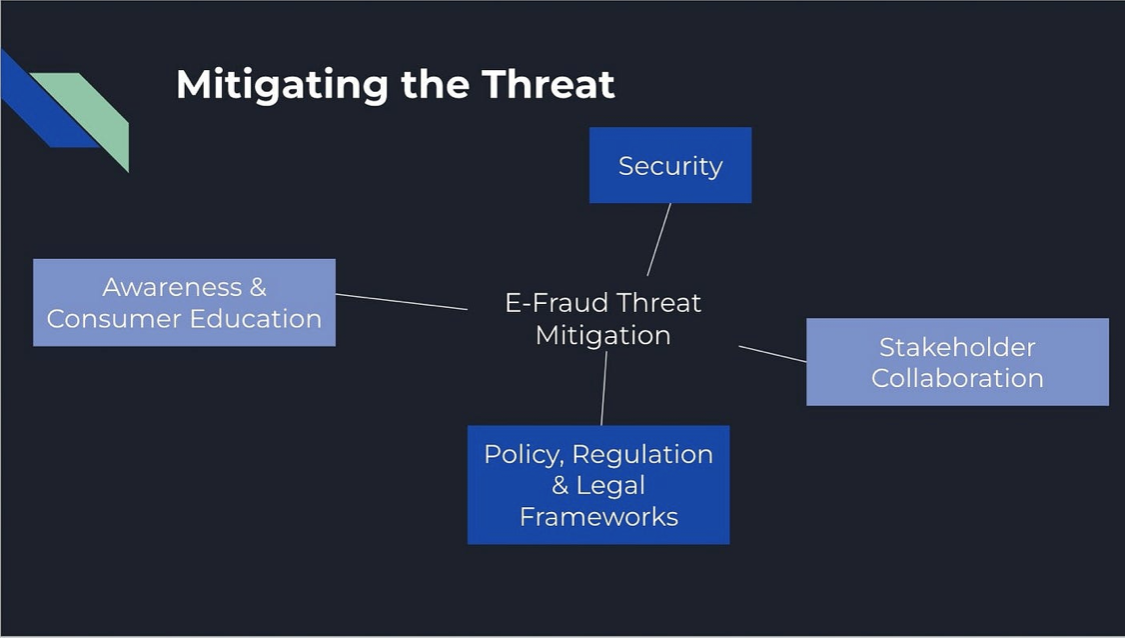by Nkemdilim Uwaje Begho
In today’s digital age, where human lives are intricately intertwined with technology, building consumer confidence in the digital economy is paramount. As individuals rely more on digital platforms for communication, financial transactions, and other essential services, it becomes crucial to establish a secure and trustworthy environment that safeguards user interests and protects their privacy.
Last week I presented the Lead paper titled Combatting E-Fraud on Telecom Platform: Building Consumer Confidence in the Digital Economy at the 2nd quarter 2023 Nigerian Open Forum of the Industry Consumer Advisory Forum (ICAF). The paper explores key strategies for threat mitigation that enable building consumer confidence and fostering trust in the digital economy as well as key-challenges that have led to the rise of e-fraud.
Key Challenges
Evolving threat landscape: E-fraudsters are becoming increasingly sophisticated, exploiting vulnerabilities in technology to carry out their fraudulent activities.
Increased Risk: Telcos double as as Mobile money operators, which increases risk non digitally literate customers are exposed to.
Lack of awareness: Many consumers lack the necessary knowledge and awareness to identify and protect themselves from e-fraud, making them easy targets.
Lack of collaboration: Stakeholders across Telcos, consumers, law enforcement and regulators don’t work together sufficiently
Limited regulation: Current regulations may not be comprehensive enough to address the evolving nature of e-fraud, leaving gaps that fraudsters exploit.
Threat Mitigation
To mitigate the threat of E-Fraud it is important to address 4 key pillars as depicted below:
Collaboration & Information Sharing
Building consumer confidence in the digital economy requires a collaborative approach between various stakeholders and telecom providers.
Regulators must implement policies that facilitate collaboration between stakeholders — telecom companies, government bodies, financial institutions, and law enforcement agencies — to share information, intelligence, and best practices.
Establish formal mechanisms for information sharing to quickly disseminate alerts and warnings regarding emerging e-fraud threats.
Encourage public-private partnerships within telco sector as well as cross sector to leverage expertise and resources for effective prevention and response to e-fraud incidents.
International cooperation and information sharing among countries can help tackle cross-border e-fraud activities more effectively.
Security Measures
Telecom providers should implement multi-layered security measures, such as two-factor authentication, encryption, biometrics or facial recognition and secure data storage, to protect customer information from unauthorized access and identity theft.
Regular security audits, vulnerability assessments, and timely software updates are crucial to identify and address potential security loopholes.
Collaboration with cybersecurity experts and law enforcement agencies can enhance the industry’s ability to detect and prevent e-fraud incidents effectively.
Regulators must provide incentives (tax benefits or grants) and support for telecom companies to invest in robust cybersecurity infrastructure.
Implement mandatory data protection and privacy standards for telecom companies, ensuring they adhere to robust practices when handling user data.
Telecoms boards should consider having a Cybersecurity expert at board level that can ensure strategies and plans proposed by management are fit for purpose and protect consumers and shareholder value with the adequate risk oversight.
Awareness and Consumer Education
Introduce educational digital and traditional integrated marketing and communications campaigns and initiatives to raise awareness among users about e-fraud risks, safe online practices, and how to recognize and report suspicious activities.
Collaborate with schools, universities, associations, networks and community organisations to incorporate digital literacy programs into curricula and member engagement.
User-friendly guides and tutorials can help individuals navigate digital platforms securely.
Outreach programs and workshops can bridge the digital literacy gap and ensure that vulnerable populations are equipped with the knowledge to protect themselves online.
Clear communication channels and accessible educational resources, such as helplines, dedicated support teams, and informative websites, should be established to educate customers and assist customers in reporting and resolving e-fraud incidents.
Foster transparency and consumer protection by requiring telecom companies to publish their data protection policies and undergo regular audits.
Policies, Legal Frameworks and Regulation
Governments and regulatory bodies should collaborate with telecom providers to establish comprehensive legal frameworks and regulations that address e-fraud effectively.
Ensure regulations cover areas such as data protection, cybersecurity standards, incident reporting, and user protection.
Regularly review and update regulations to keep pace with evolving e-fraud techniques and emerging technologies. This requires a quick and often ad-hoc policy review process.
Education of policy makers to ensure they understand risks and risk mitigation approach.
Adequate penalties and strict enforcement against e-fraud perpetrators can act as strong deterrents and promote a secure digital ecosystem.
Set up regulatory mechanisms to continuously monitor and evaluate the effectiveness of implemented e-fraud prevention policies.
Conclusion
Building consumer confidence in the digital economy is a collective responsibility that requires the collaboration of businesses, policymakers, and individuals. By enhancing data protection and privacy, strengthening cybersecurity measures, fostering transparent communication, empowering users through education, promptly addressing issues, fostering industry standards, and collaborating with government bodies, we can create a secure and trustworthy digital ecosystem.
Nkemdilim Uwaje Begho
Nkemdilim Uwaje Begho is a seasoned Information Technology professional with over 15 years of industry experience in Africa’s largest emerging economy with a deep purpose and focus on bridging the digital divide and transforming Africa by harnessing the benefits of digital. At home in technology from childhood, Nkemdilim is walking in her fathers’ footsteps as a second-generation Nigerian Information Technology expert. Currently CEO of Future Software Resources Ltd. (Futuresoft), one of Nigeria’s leading digital & technology solutions companies, providing a broad range of solutions for the scaling African enterprise, to consistently attract and retain its target audience, optimize its processes and increase its bottom line.
More articles by Nkemdilim & the FutureSoft Team















